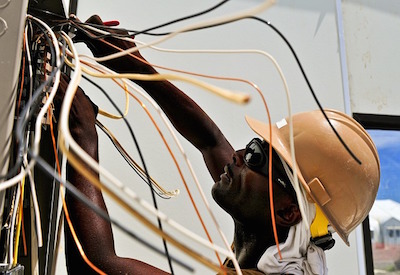Federal Government to Fund Research into Changing and Emerging Occupations

Oct 21, 2018
To proactively address the needs of our current and future labour market, Electricity Human Resources Canada (EHRC) will receive federal funding for the new National Occupational Standards (NOS) and Career Portal project. This project will explore the transformational impact of technology, digitalization and innovation on the changing nature of work in the sector.
Through this research a total of 15 national occupational standards and essential skills profiles will be revised or developed to better prepare jobseekers to transition into the electricity sector. Occupations to be covered include:
• electrical engineering technician/ technologist
• power protection and control technician/ technologist
• power systems operator
• solar photovoltaic installer
• power station operator
• wind turbine technician
• geothermal heat pump installer
• solar thermal installer
• utilities project manager
• heat pump designer
• small system designer (solar)
• energy storage technician
• smart grid specialist
Two additional occupations remain to be determined.
The labour market intelligence gathered during the research will examine current occupations or job functions facing change or requiring re-skilling or up-skilling, as well as entirely emerging occupations that will require specialized skills.
This project is funded in part by the federal government’s Sectoral Initiative Program and supports its goal to address current and future skills shortages through the development and distribution of sector-specific labour market information.
Smart grids, renewable electricity generation, automation, carbon capture and storage, and electric vehicles are transforming the traditional electricity industry. Technological innovation is reshaping and reinventing the skills and occupations required to support the electrical grid of the 21st century.
“By encouraging the adoption of new technologies and putting in place the appropriate support for workers, Canada can minimize both skills shortages and technological unemployment,” says EHRC CEO Michelle Branigan. “A long-term strategic and national approach to human resource planning and training is therefore critical to ensuring that we continue to maintain the level of growth, reliability, safety and productivity in the system — with a workforce that is truly inclusive and diverse.”
According to Jim Kellett, Board Chair, EHRC, “The accelerated pace of change in our sector, including advancements in technology and innovation will also have a huge impact on our workforce. We need to anticipate what those impacts will be so employers, employees and job seekers alike can respond to the changing structure of the sector and future job opportunities.”
Find out more: https://electricityhr.ca/government-of-canada-invests-in-the-future-of-work-in-todays-rapidly-changing-electricity-sector-electricity-human-resources-canada-to-research-changing-and-emerging-occupations/
Photo by Skeeze on Pixabay.
















